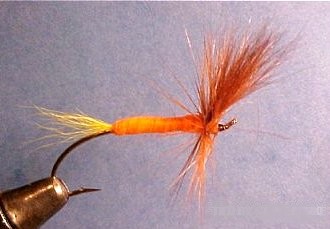
On The Fly
"Fly tying is a school from which we never graduate"
TYING NEWS
The September meeting of Southern Oregon Fly Tiers (SOFT)
was held Thursday the 23rd at the Rogue River Library. Turnout was good with
a few more tiers from the Grants Pass area. The exchange fly was the Fall
Favorite and Ron Rogers won the raffle again. Over the past four months the
members of SOFT as a group, contributed 6-dozen steelhead flies to the RFF
and SOFF auctions.Numerous members tied and donated additional dozens to
these vital fundraising events. I would encourage all members to attend the
banquet/auction and bid generously on these great custom-tied flies. That's
all the thanks we need.
Johnny Hale and myself will be teaching the beginning and
intermediate tying classes again this next year. We are already planning
patterns and materials. Last year we had members attend who didn't have
vises or tools but did have the great desire to learn. If any members have
any extra tools or materials, they will be appreciated and put to good use
getting a whole new generation started tying.
The next SOFT meeting will be October 28th. If anyone
wants to get started tying or just wants help with a pattern or technique,
please accept our invitation to attend our informal group the fourth
Thursday of each month at the Rogue River Library at 7 p.m. Any questions,
call Dan Kellogg at 773-4724.
 PATTERN OF THE MONTH - October Caddis
PATTERN OF THE MONTH - October Caddis
hook: Size 6, 8, or 10 steelhead
Thread: Brown 6/0.
Tail: Yellow calf tail.
Body: Yellow/orange or fluorescent orange yarn.
Wing: Red Squirrel
Throat: Brown hackle
Tying Instructions:
1. Tie on in front and tie on a bunch of red squirrel, one shank-length long,
with tips pointing forward over eye. Leave in that position.
2. Trim butts of hair at an angle to form tapered body and wind thread to
above point of hook and tie in calftail somewhat sparse.
3. Tie in yarn and wind forward to just behind wing.
4. Tie in brown hackle and wind 3-4 turns behind wing.
5. Wrap thread in front of and under wing until proper wing angle is
achieved. Divide the wing evenly with figure-8 wraps, whip finish, and
cement.
This surface-fly version of the October Caddis was originated by Bill Bakke and is fished by riffling it on the surface to imitate a struggling adult. During September and October large trout and steelhead key on these "biggie size" caddis whenever they are present. Throughout the west you'll find them in most freestone streams and tail waters with strong current and rocky bottoms. They start hatching in early September and are available through October. The hatch is sparse, a few adults fluttering on the surface or near the shoreline brush. If you're on the river this time of year make sure you have at least one of the many patterns imitating the October Caddis in case the hatch is on.
TYING TIPS - Divided Wings
On the skater version of the October Caddis it's critical
that the hair wing be divided and cocked forward at 35 degrees for good
action. The process of dividing feather or hair fibers and securing them
with figure-8 wraps can be frustrating and difficult for many of us. Try
this technique I learned from master tier, Dick Bonamarte. With the wing
material tied in, divide the fibers equally with your bodkin held parallel
to the hook shank, and hold the bodkin in place while winding thread in the
figure-8 style once over the bodkin and wing clumps. Now slowly remove the
bodkin while maintaining thread tension and then finish the figure-8 wraps.
I think you'll find this method will result in evenly divided wings tied
faster and more secure.
Tie One On,
Dan Kellogg
(you can contact me at FLYGUY@EZNORTHWEST.COM)